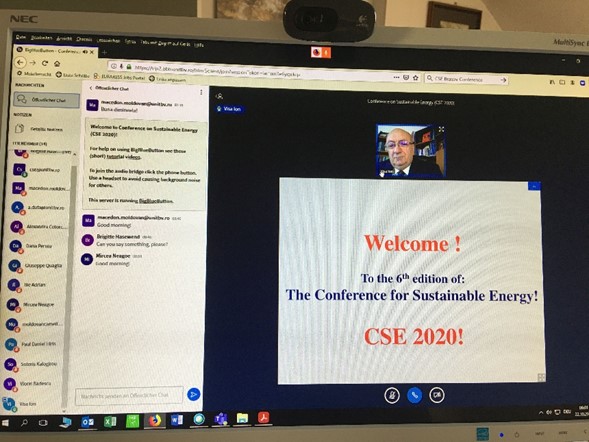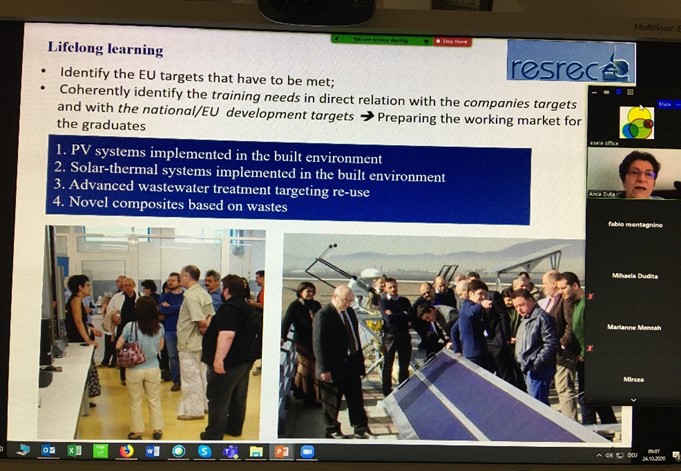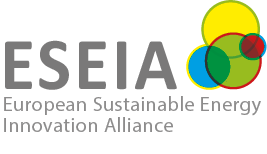ESEIA Conference 2020
The Transilvania University of Brasov (UTBv), the European Sustainable Energy Innovation Alliance (ESEIA), and the Romanian Academy of Technical Sciences organized the 6th edition of the Conference for Sustainable Energy CSE from 22 – 24 October 2020 in Brasov, Romania. The core topic of this year’s international conference edition was Solar Energy Conversion in Communities. These were fruitful three days of great discussion and sharing good thoughts as well as practises with the main theme on Solar Energy Conversion in Communities. The conference was hosted by CSE UTBV.
Thursday, 22 October 2020 Plenary Session
The opening to the plenary was done by Professor Ion Visa. ESEIA would like to thank him for organising the event!

ESEIA Director Brigitte Hasewend gave a plenary presentation with the focus on European Green Deal and how it could promote sustainable energy research and innovation partnerships. The audience was reminded that EU would like to become the first climate neutral continent by 2050 in which, the transition to clean energy is a key. In the current context of COVID-19 pandemic, EU needs to focus on the green economy and renewable energy policy in its recovery strategies. Next Generation EU is divided into three pillars to fight against the climate crisis and the economic downturn. These create a need for the research and innovation initiatives in the renewable energy production.
The focus of the presentation was also on the mobilization of the research and the fostering of innovation. Power sector needs to be developed based largely on renewable source. In terms of mobility, EU envisages the need for recharging and fuelling stations for zero and low-emission vehicles by 2025. By 2050, the building sector must be highly energy efficient and decarbonised. In order to carry out the transformation EC will support Member States through investments in R&I, in which the industrial partnerships play a role.
Importance of the session was also put on the European Green Deal call part of which, ESEIA is currently working on two proposals, one on AU-Green Transition and Energy and the other one Climate Education. ESEIA Director also gave an overview of the five European cross-sector Working Group as part of the ESEIA Strategy 2030 and introduced the ESEIA Education and Training Programme (ETP) which aims to provide Capacity-Building for people and institutions.
To conclude, the ESEIA Director pointed out that in addition to industrial initiatives supported by R&I, skills development of people and capacity‐building are the key to making the Green Deal a success.
The presentation by ESEIA Director can be found here.
Contact:
ESEIA Team, office@eseia.eu
Saturday, 24 October 2020, ESEIA Panel on Climate Education: Lively 90 Minute Saturday Morning Discussion
On 24 October, in the framework of the 6th Conference for Sustainable Energy 2020, the ESEIA Director hosted the ESEIA Panel on Climate Education. The invitation to ESEIA Panel on Climate Education can be found here.
First speaker, Prof. Dr Anca Duta, UTBv, RO, UTBv, focused on the educational training for sustainability in UTBv, Romania. In UTBv, students have a possibility to study engineering of renewable energy systems for Bachelor’s degree or focus on production design for sustainable development and environment in Master’s studies. Research on a PhD level is possible in the field of mechanical science or materials science and engineering. Prof. Dr. Anca Duta highlighted that spreading the sustainable midset thinking has to be done, in addition amongst young high school graduates, also for learners in lifelong learning courses. To reach different audiences, in UTBv many training sessions were developed with companies and co-operation with pre-university structures is also valued, both with students and teachers.

Second presentation was by Prof. Dr. Gabriela Martínez Sainz from the School of Education, University College, Ireland. She presented the conclusions of ALLEA report on climate change education initiatives in Europe. A total of 67 responses from 14 different countries were recorded, including governmental organisations, national academies and so on. Based on the results, a total of 8 recommendations were formed. One of the recommendations was that the CCE (climate change education) initiatives need to focus more on mitigation and adaptation and consult the IPCC report for recent developments. Another recommedation pointed out by Dr. Sainz was the need for initiatives that focus on solutions and collective actions to decrease the eco-anxiety and foster a sense of agency.
The third speaker was Michael Krobath, CEO of Environmental Education Centre Graz, Austria whose presentation was on the challenges of climate change education. Mr Krobath’s team has 10 years of experience with organising climate workshops, projects from primary school to high school. Mr Krobath gave an overview of different activites they organize such as basic experiments, project teaching, games and creativity incorporated in the primary school level. Mr Krobath presented the competences needed in the climate change education which are taught in a climat simulation game. In Austria, there is a basic decree on envrionmental education for sustainable development which was used as inspiration for the game. Some of the compentences highlighted in Krobath’s presentation were compentencies in political education (dealing with current political issues, possibility of influencing decisions, active contribution to the development of democracy), compentecies in business and consumer education, compentences in global learning (critical reflect and understanding of global issues), social and personal skills (ability to reflect, involvement in the community), media skills (critical and creative thinking) and gender skills (question of role norms, leadership roles in communities) amongst other skills.
Contact
More information

